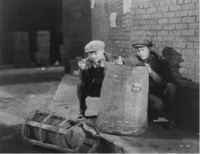Gangsters at BFI Southbank
 Following the Wall Street Crash in 1929 the Gangster Movie genre erupted like a crime wave with more than 60 films produced between 1930 and 1933 alone. This July BFI Southbank will take a look at some of the key films from this prolific period of filmmaking.
Following the Wall Street Crash in 1929 the Gangster Movie genre erupted like a crime wave with more than 60 films produced between 1930 and 1933 alone. This July BFI Southbank will take a look at some of the key films from this prolific period of filmmaking.The Motion Picture Production Code, which was enforced in 1934, was a set of censorship guidelines citing what was acceptable and unacceptable in films for cinema-goers to view.
The pre-Production Code movie gangster, whose exploits overlapped with real-life rural desperados, aren’t heroic in the conventional sense – they’re not righteous, handsome or glamorous – but their dynamism is irresistible.
Edward G Robinson’s Rico Bandello in Little Caesar (1930) is a trigger-happy hood, no question, but he’s also, typically, a first-generation American on the make, a go-getter who has sized up the odds against him and figures on levelling the score.
Paul Muni’s Tony Camonte in Howard Hawks’ Scarface: The Shame of a Nation (1932) and James Cagney’s Tom Powers in The Public Enemy (1931) are insolent, assertive and at the same time aspirational. No wonder the establishment clamped down and insisted that all films adhered to the rules.
The post-war films of the 40s and 50s saw a focus on the individual gangster in films such as Dillinger (1945) and Al Capone (1959). Then, with the rise of the Hollywood blockbuster in the 60s and 70s, the films focused on the excess of the gangster, demonstrated by the violence in Roger Corman’s The St Valentine’s Day Massacre (1967) and Arthur Penn’s Bonnie and Clyde (1967) in order to draw the crowds.
Our representation from the 80s onwards include films such as Scarface (1983), Brian De Palma’s seminal remake, and Sergio Leone’s Once Upon a Time in America (1983) that look back to the classic Gangster film whilst others such as The Newton Boys (1998) try something new like endeavouring to bring together the Gangster and Western genres.
With guns, guts and gals, Gangsters at BFI is a grapefruit smashing season not to be missed!
The BFI Southbank is open to all and BFI members are entitled to a discount on all tickets. Unless otherwise stated tickets are £9.00, concessions £6.65, members pay £1.40 less on any ticket. For more information, visit bfi.org.uk/southbank.

